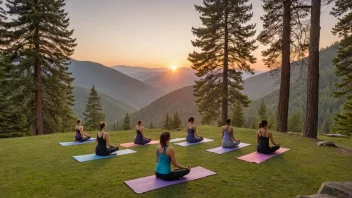When it comes to wellness retreats, the environment plays a critical role in shaping the experience. Two of the most popular settings for these retreats are nature-focused locations, such as mountains or forests, and urban environments, which offer modern amenities and cultural experiences. Each setting has its unique advantages and disadvantages, making it essential for travelers to consider their preferences and needs when choosing the right wellness retreat. This article will explore the pros and cons of both nature and urban wellness retreats, helping you decide which environment suits your wellness journey best.
Natural Settings: The Allure of Mother Nature
Nature has long been associated with healing and rejuvenation. Retreats set in serene environments like forests, mountains, or by the sea often emphasize tranquility, solitude, and connection to the natural world. Here are some of the primary advantages and disadvantages of choosing a wellness retreat in a natural setting:
Pros
- Serenity and Peace: Nature retreats often provide a peaceful atmosphere, away from the hustle and bustle of daily life, allowing attendees to relax and unwind.
- Connection to Nature: Being surrounded by trees, mountains, or oceans can foster a deep connection to the environment, enhancing mindfulness and well-being.
- Physical Activities: Natural settings provide ample opportunities for outdoor activities such as hiking, yoga in the park, or swimming in natural water bodies, promoting physical wellness.
- Fresh Air and Natural Light: Exposure to fresh air and natural light can improve mood and overall health, making nature retreats a popular choice for rejuvenation.
Cons
- Accessibility: Remote nature retreats may be more difficult to reach, requiring longer travel times and possibly limiting access to emergency services.
- Limited Amenities: Some natural retreats may lack modern conveniences such as Wi-Fi, fine dining, or spa services, which could be a dealbreaker for some travelers.
- Weather Dependence: Outdoor activities are susceptible to weather conditions, which can impact the retreat experience.
Urban Settings: The Vibrancy of City Life
On the other hand, urban wellness retreats are often set in bustling cities that offer a blend of cultural experiences and modern conveniences. These retreats can provide a different kind of rejuvenation, one that combines relaxation with exploration. Here are the pros and cons of urban wellness retreats:
Pros
- Accessibility: Urban locations are typically easier to reach, often with multiple transportation options available, making them more convenient for travelers.
- Variety of Amenities: Urban retreats often provide a wide range of amenities, including fitness centers, spas, gourmet restaurants, and cultural activities.
- Social Opportunities: Attending a retreat in a city can foster social interactions with other participants, providing networking opportunities and shared experiences.
- Blend of Experiences: Urban retreats can combine wellness practices with cultural experiences, such as art galleries, theater performances, or local cuisine.
Cons
- Noise and Distraction: The hustle and bustle of city life can be overwhelming and may hinder relaxation and meditation.
- Limited Nature Exposure: Urban retreats may lack the natural beauty and tranquility found in more remote locations, which some participants may find essential for their wellness.
- Higher Costs: Urban retreats may come with higher price tags due to the cost of living in cities, making them less accessible for some travelers.
Comparative Analysis: Finding the Right Fit
When deciding between a nature or urban wellness retreat, consider the following factors to help guide your choice:
- Your Wellness Goals: If your primary aim is to disconnect and immerse yourself in nature, a natural setting may be more beneficial. Conversely, if you seek a blend of relaxation and cultural engagement, an urban retreat could be ideal.
- Travel Preferences: Consider how far you are willing to travel and the kind of experience you desire. If you prefer the convenience of urban amenities, opt for a city retreat; if you enjoy the journey, a nature retreat may be more fulfilling.
- Budget: Evaluate your budget and what you value most in a retreat experience. Urban settings may be pricier, but they often offer more diverse options.
- Social vs. Solitude: Determine whether you prefer the social aspects of a group retreat or the solitude often found in nature retreats.
Conclusion
Both nature and urban wellness retreats offer unique benefits and experiences. Nature retreats provide a serene and tranquil environment perfect for relaxation and self-reflection, while urban retreats offer convenience and a diverse range of amenities and cultural experiences. Ultimately, the best choice depends on your personal preferences, wellness goals, and travel style. Whether you choose to retreat to the mountains or immerse yourself in city life, the most important factor is to find a setting that resonates with you and supports your journey towards wellness.






